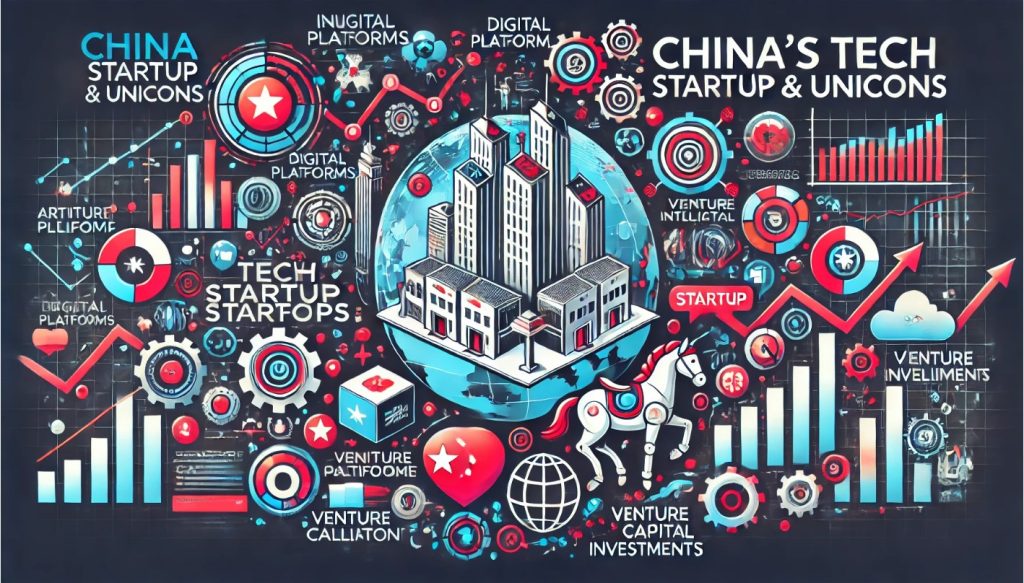China’s technology sector has experienced a remarkable transformation over the past two decades, evolving from a primarily manufacturing-based economy to one that is now a global leader in digital innovation, e-commerce, fintech, artificial intelligence (AI), and other cutting-edge technologies. Central to this transformation is the rise of China’s tech startups, which have emerged as key players in the global market. These companies have become the engines of the country’s economic growth and technological progress, helping to shape new industries and revolutionize existing ones.
China’s startup ecosystem is characterized by rapid innovation, venture capital activity, government support, and an increasingly sophisticated consumer market. A key feature of this ecosystem is the emergence of “unicorns” – privately held tech startups valued at over $1 billion. As of the early 2020s, China has become home to some of the world’s most valuable and influential unicorns, which are often at the forefront of global technological trends. These companies have not only contributed to China’s economic growth but have also challenged established global giants in sectors such as social media, e-commerce, autonomous vehicles, and fintech.
Key Drivers of China’s Tech Startup Boom
Government Policies and Support
China’s rapid growth as a tech powerhouse has been heavily influenced by government policies aimed at fostering innovation and entrepreneurship. The government has rolled out numerous initiatives to promote the development of startups, particularly in high-tech sectors such as AI, cloud computing, robotics, and biotechnology.
The “Made in China 2025” initiative, launched in 2015, outlines the government’s vision for transforming the country into a global leader in advanced manufacturing and technology. This includes increasing the domestic production of semiconductors, robotics, and other high-tech products. The policy has led to a surge in government funding for tech startups and the creation of innovation hubs in cities like Shenzhen, Hangzhou, and Beijing. These cities have become hotspots for tech entrepreneurship, providing startups with access to both funding and talent.
Additionally, the Chinese government has provided substantial support in terms of tax breaks, subsidies, and grants for early-stage startups, particularly those in the technology and innovation sectors. Special economic zones and startup incubators, many of which are government-backed, have fostered collaboration between tech companies, research institutions, and government agencies.
Availability of Venture Capital
Another crucial factor behind the rise of Chinese tech startups is the robust venture capital (VC) ecosystem. China is now one of the world’s largest markets for venture capital, with a highly developed network of angel investors, VC firms, and corporate investors. This has enabled early-stage companies to secure the necessary funding to scale rapidly.
In recent years, VC firms like Sequoia China, IDG Capital, and Hillhouse Capital have been instrumental in funding some of China’s most successful startups. These firms not only provide capital but also bring deep industry expertise, connections to global markets, and guidance on scaling operations. Chinese tech startups often raise funding through multiple rounds, rapidly increasing their valuations as they prove their business models and technological innovations.
Moreover, the growing number of Chinese tech giants, including Alibaba, Tencent, and Baidu, has played a key role in funding startups. These companies, which themselves started as small startups in the 1990s and early 2000s, have become major investors in the ecosystem. Their investments in smaller startups provide not only financial backing but also potential partnerships, access to large user bases, and the possibility of strategic acquisitions.
Talent Pool and Education
China’s vast population provides an extensive talent pool for its tech startups. The country has a strong emphasis on STEM (science, technology, engineering, and mathematics) education, producing millions of graduates every year with skills in software engineering, AI, data science, and other high-tech fields. Universities such as Tsinghua University, Peking University, and Fudan University are renowned for their research and development in cutting-edge technologies, creating a pipeline of skilled professionals who are eager to work in the burgeoning startup sector.
Many of China’s top entrepreneurs have a background in engineering or computer science, and some have gained experience working at major global tech companies before founding their own startups. For example, Zhang Yiming, the founder of ByteDance, previously worked at Microsoft and other tech companies before launching the now-famous app TikTok.
As China’s startup ecosystem matures, the focus is also shifting toward attracting global talent, including returning Chinese nationals who have worked abroad. Cities like Beijing, Shanghai, and Shenzhen are becoming increasingly multicultural, with a mix of local and international talent contributing to the growth of China’s tech sector.
Prominent Chinese Unicorns and Their Impact
ByteDance – The Creator of TikTok
One of China’s most globally successful tech startups is ByteDance, the parent company of the wildly popular social media platform TikTok. Founded in 2012 by Zhang Yiming, ByteDance quickly became a global unicorn, reaching a valuation of over $100 billion by 2020. The company’s rapid ascent is a testament to its innovation and ability to capture the attention of users worldwide.
ByteDance’s success can be attributed to its use of cutting-edge artificial intelligence algorithms that power its content recommendation engine. The platform’s personalized content, tailored to each user’s interests, has made TikTok a global phenomenon. TikTok has rapidly grown in popularity across North America, Europe, and other regions, challenging established social media giants like Facebook and YouTube.
In addition to TikTok, ByteDance owns a number of other platforms and apps, including Toutiao (a Chinese news aggregation platform) and Lark (a collaboration and productivity tool). ByteDance has become a formidable force in the global tech landscape, and its success is an example of China’s growing influence in the global digital economy.
Didi Chuxing – The Ride-Hailing Giant
Didi Chuxing, often referred to as the “Uber of China,” is another standout unicorn in the Chinese tech space. Founded in 2012, Didi has rapidly grown to dominate China’s ride-hailing market, with over 500 million users as of 2020. The company’s success can be attributed to its ability to leverage big data, AI, and deep integration with local transportation infrastructure.
Didi’s platform offers not only ride-hailing services but also shared mobility solutions, food delivery, and even autonomous vehicle development. In 2016, Didi acquired Uber’s Chinese operations, cementing its position as the leading player in the country’s ride-hailing industry. The company has since expanded into international markets, making significant inroads in Latin America, Southeast Asia, and Russia.
Didi’s valuation surged to over $60 billion by 2020, making it one of China’s largest and most valuable tech startups. The company’s success story underscores China’s growing leadership in the global mobility sector and its ambition to dominate in fields like AI, autonomous driving, and big data analytics.
NIO – The Electric Vehicle Innovator
NIO is a standout example of China’s growing prowess in the electric vehicle (EV) industry. Founded in 2014, NIO has emerged as a key competitor to global EV leaders like Tesla. The company designs, manufactures, and sells electric SUVs and sedans, with a focus on premium electric vehicles aimed at the high-end market.
NIO’s success is due in part to its innovative approach to EV development, including the launch of its “battery-as-a-service” (BaaS) model, which allows customers to lease their batteries rather than buy them outright. This unique offering addresses the high upfront cost of EVs, making them more affordable for consumers. NIO’s vehicles are also equipped with advanced autonomous driving features, positioning the company as a leader in China’s rapidly expanding EV market.
In 2020, NIO became one of the first Chinese EV companies to be listed on the New York Stock Exchange, further cementing its status as a unicorn. The company’s impressive growth has captured global attention, and it is expected to continue expanding its footprint in both domestic and international markets.
Meituan – The Super App for Services
Founded in 2010 by Wang Xing, Meituan has evolved from a group-buying website into one of China’s leading super apps, offering a wide range of services, from food delivery to hotel booking, movie ticketing, and even bike-sharing. Meituan’s rapid expansion and integration of various consumer services into a single platform have made it an indispensable part of daily life for millions of Chinese consumers.
In 2018, Meituan went public in Hong Kong, reaching a valuation of over $50 billion. The company’s success is driven by its ability to leverage big data and AI to optimize service delivery and personalize consumer experiences. Meituan has become a significant player in the global on-demand services industry, competing with platforms like Uber Eats and DoorDash.
Meituan’s success exemplifies China’s growing expertise in the super-app model, where a single app can fulfill multiple consumer needs. This model has proven to be highly effective in China’s densely populated cities, where convenience and efficiency are highly valued.
The Challenges Facing China’s Tech Startups
Regulatory Hurdles
Despite the impressive growth of China’s tech startups, the industry faces significant regulatory challenges. The Chinese government has enacted a series of regulations aimed at controlling the flow of data, ensuring privacy protection, and preventing anti-competitive practices in the digital economy. These regulations have had a profound impact on the way tech startups operate, particularly those in the e-commerce, fintech, and social media sectors.
For instance, in 2021, the Chinese government introduced new data privacy laws that placed stricter controls on how tech companies collect and use consumer data. Similarly, the government has cracked down on monopolistic practices in the tech sector, leading to regulatory investigations and fines against major players like Alibaba and Tencent.
These regulatory changes are forcing Chinese startups to adapt their business models to comply with new laws and expectations. While these regulations are intended to create a more sustainable and fair digital economy, they also pose challenges for companies looking to scale rapidly or expand internationally.
International Expansion and Competition
As Chinese tech startups continue to scale, many are looking beyond the domestic market for growth opportunities. However, expanding into foreign markets presents significant challenges, particularly in regions with established competitors and complex regulatory environments.
For example, companies like ByteDance and Didi have faced scrutiny in Western markets due to concerns over data privacy and national security. The US government, in particular, has raised concerns about the potential misuse of user data by Chinese companies, leading to calls for stricter regulations on foreign tech companies.
Moreover, Chinese startups face fierce competition from established global players in many sectors. For instance, NIO competes with Tesla in the electric vehicle market, while ByteDance faces competition from Facebook and YouTube in the social media space. Navigating these competitive landscapes while adhering to local regulations can be a significant hurdle for Chinese startups seeking to become global leaders.
The Future of China’s Tech Startups
Rising Innovation in AI and 5G
Looking ahead, China’s tech startups are poised to continue leading in innovation, particularly in fields like artificial intelligence, 5G, and blockchain. The Chinese government has prioritized AI as a key area of focus in its long-term development plans, and many tech startups are at the forefront of this transformation.
AI applications are already prevalent in industries such as healthcare, finance, logistics, and entertainment, and the integration of 5G networks is expected to further accelerate these innovations. Startups that can harness the power of AI and 5G to create disruptive new technologies will be well-positioned to lead China’s tech sector into the next phase of growth.
Globalization of Chinese Tech Unicorns
As Chinese unicorns continue to mature, many are focusing on expanding their international presence. Companies like ByteDance, NIO, and Didi are already making significant inroads into global markets, and their continued success will likely depend on their ability to navigate the complexities of global competition and regulatory environments.
Chinese tech companies are also increasingly investing in international talent and partnerships to bolster their global growth. As they scale globally, these companies will play a key role in shaping the future of technology, not just in China but across the world.







